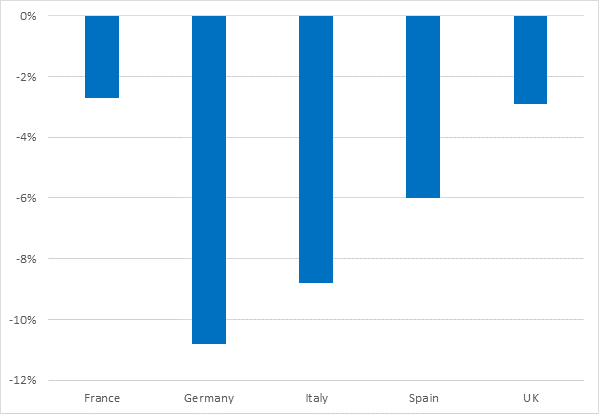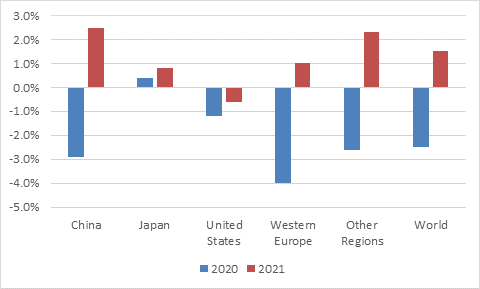Automotive industry cowered by COVID-19?
10 March 2020

10 March 2020
As the coronavirus (COVID-19) continues to spread rapidly, senior data journalist Neil King presents Autovista Group’s analysis of the impact on the automotive industry. In this first part of three, King considers the implications for the global and European new-car markets.
It was always inevitable that the coronavirus would disrupt the automotive supply chain, which Autovista Group first highlighted early in February. Questions now focus on the duration and severity of the impact, but without any answers so far. What is clear is the impact the spread of the virus is having on industry. In the automotive sector, the downturn in productivity and the disruption to the automotive supply chain is already impacting both new-car demand, supply and, in turn, registrations.
While many believe they are not being affected by COVID-19, efforts to manage the spread of the virus completely change the way we do business, meet people, travel and plan holidays. There is an increasing risk – and imposition – that people will avoid travelling and meeting up with others, both for business and socially. This is not only driven by concerns of becoming infected with the coronavirus but also by the fear of being isolated somewhere, and even being put into quarantine whilst away from home.
The situation is changing daily and has many consequences and repercussions, not least economically. Simply considering how stock markets have reacted in recent days, including a pause on trading in New York (9 March), it is easy to imagine the magnitude of the impact that the coronavirus could have on a country’s economy.
Moody’s downgrades forecasts
The credit rating agency Moody’s has downgraded its GDP forecast for 2020 to 2.4% in its February update and has slashed its global vehicle sales forecast ′due to the coronavirus outbreak reducing demand and disrupting automotive supply chains.’
Moody’s now expects global vehicle sales to decline by 2.5% in 2020. This follows a 4.6% drop in 2019 and, moreover, is a significant downward revision from the 0.9% decline previously projected for this year. Crucially, this new forecast is ′based on the spread of the coronavirus being contained by the end of the first quarter.’
The upside of this assumption, that COVID-19 will be contained by the end of March, is that the impact on new-car markets is still likely to be severe in the short term but the industry has the rest of the year to recover. So 2020 as a year is not expected to go down in history as catastrophic.
It is worth looking to events in the past considered to be catastrophic. The Fukushima Daiichi reactor disaster in Japan in 2011, after an earthquake and tsunami in the region, had a direct impact on the supply chain worldwide. However, almost 80 million vehicles were registered globally in 2011, up 3%, despite the significant downturn in Japan. The fact that manufacturers typically build up stock, at least of their most popular and cheapest models, should allow for some inertia regarding new-car registrations.
However, this broad assumption will quickly change if COVID-19 persists across the current year and even beyond.
New-car impact
China’s new-vehicle registrations plummeted by around 92% in the first half of February, as the coronavirus outbreak continues to rock the automotive industry. Moody’s predicts that vehicle sales will fall 2.9% in China in 2020, notably down from the 1% growth that was previously forecast.
′Cautious consumers are steering clear of crowded areas, including auto dealerships, while corporate demand for vehicles is weakening as broader economic uncertainties cause companies to scale back capital spending. Work stoppages and lower production levels because of government-mandated business days off, the reduced flow of migrant workers across China and disruptions in auto-parts supply chains have lowered production levels,’ Moody’s reports.
In Europe, however, the impact has yet to translate into such dramatic downturns in new-car registrations. Data for February 2020, gathered for the major European markets from the respective industry associations, reveals that only Germany suffered a double-digit decline in February.
New-car registrations, Big Five European markets, year-on-year percentage change, February 2020
 Source: CCFA, KBA, ANFIA, ANFAC, SMMT
However, new cases are emerging in European countries every day. The crisis should not be underestimated and many observers already see the effects as being bigger than the global financial crisis that erupted in 2007. It is also noteworthy that Moody’s forecasts that Western Europe will suffer the greatest decline in light-vehicle sales in 2020.
Light-vehicle sales forecast by region, year-on-year percentage change, 2020 and 2021
Source: CCFA, KBA, ANFIA, ANFAC, SMMT
However, new cases are emerging in European countries every day. The crisis should not be underestimated and many observers already see the effects as being bigger than the global financial crisis that erupted in 2007. It is also noteworthy that Moody’s forecasts that Western Europe will suffer the greatest decline in light-vehicle sales in 2020.
Light-vehicle sales forecast by region, year-on-year percentage change, 2020 and 2021
 Source: Moody’s
Italy lockdown
It is too difficult to say which European countries will be most affected, even if only in the short term. It all depends on how COVID-19 takes hold and how national governments seek to contain the spread. However, as Italy now has the highest number of reported cases outside China and, at the time of writing, emergency measures were extended to cover the whole country, the assumption is that the Italian market will suffer the most, at least in the short term.
France was looking to escape the coronavirus relatively unscathed as carmakers that are not key to the French market, such as Jaguar Land Rover, have been most affected. Moreover, France is relatively shielded against exposure to disruption in the supply of parts from China and restrictions have been limited too. However, this could change as, on 8 March, France reported 1,126 cases in total, overtaking Germany to be the second-largest number of infections in Europe after Italy. The French Government has banned gatherings of more than 1,000 people, following the example set by Switzerland that led to the cancellation of the Geneva Motor Show.
The UK has the lowest number of reported cases of COVID-19 among the big five European countries but would suffer if carmakers prioritised producing left-hand-drive vehicles. Such a move depends on demand and the profit margin that manufacturers achieve in the country. If both are good, then manufacturers are not expected to focus more on left-hand-drive markets. It is conceivable that supply will slow but manufacturers will still be keen to supply their UK-based operations. As it stands, Autovista Group has just revised its forecast for UK new-car registrations in 2020 down to a decline of 3.0%, from a 1.5% decline previously.
Autovista Group contributors to this article include: Yoann Taitz, Operations Director, Autovista France; Christof Engelskirchen, Chief Economist, Autovista Group; Andreas GeilenbrÜgge, Head of Valuations and Insights, Schwacke Germany; Ana Azofra, Valuation and Insights Manager, Autovista Spain; and Jayson Whittington, Chief Editor, Cars and Leisure Vehicles, Glass’s UK.
Parts 2 and 3 of this series will provide Autovista Group analysis of the COVID-19 impact on used-car markets and residual values, manufacturers, and electric vehicles.
Source: Moody’s
Italy lockdown
It is too difficult to say which European countries will be most affected, even if only in the short term. It all depends on how COVID-19 takes hold and how national governments seek to contain the spread. However, as Italy now has the highest number of reported cases outside China and, at the time of writing, emergency measures were extended to cover the whole country, the assumption is that the Italian market will suffer the most, at least in the short term.
France was looking to escape the coronavirus relatively unscathed as carmakers that are not key to the French market, such as Jaguar Land Rover, have been most affected. Moreover, France is relatively shielded against exposure to disruption in the supply of parts from China and restrictions have been limited too. However, this could change as, on 8 March, France reported 1,126 cases in total, overtaking Germany to be the second-largest number of infections in Europe after Italy. The French Government has banned gatherings of more than 1,000 people, following the example set by Switzerland that led to the cancellation of the Geneva Motor Show.
The UK has the lowest number of reported cases of COVID-19 among the big five European countries but would suffer if carmakers prioritised producing left-hand-drive vehicles. Such a move depends on demand and the profit margin that manufacturers achieve in the country. If both are good, then manufacturers are not expected to focus more on left-hand-drive markets. It is conceivable that supply will slow but manufacturers will still be keen to supply their UK-based operations. As it stands, Autovista Group has just revised its forecast for UK new-car registrations in 2020 down to a decline of 3.0%, from a 1.5% decline previously.
Autovista Group contributors to this article include: Yoann Taitz, Operations Director, Autovista France; Christof Engelskirchen, Chief Economist, Autovista Group; Andreas GeilenbrÜgge, Head of Valuations and Insights, Schwacke Germany; Ana Azofra, Valuation and Insights Manager, Autovista Spain; and Jayson Whittington, Chief Editor, Cars and Leisure Vehicles, Glass’s UK.
Parts 2 and 3 of this series will provide Autovista Group analysis of the COVID-19 impact on used-car markets and residual values, manufacturers, and electric vehicles.
 Source: CCFA, KBA, ANFIA, ANFAC, SMMT
However, new cases are emerging in European countries every day. The crisis should not be underestimated and many observers already see the effects as being bigger than the global financial crisis that erupted in 2007. It is also noteworthy that Moody’s forecasts that Western Europe will suffer the greatest decline in light-vehicle sales in 2020.
Light-vehicle sales forecast by region, year-on-year percentage change, 2020 and 2021
Source: CCFA, KBA, ANFIA, ANFAC, SMMT
However, new cases are emerging in European countries every day. The crisis should not be underestimated and many observers already see the effects as being bigger than the global financial crisis that erupted in 2007. It is also noteworthy that Moody’s forecasts that Western Europe will suffer the greatest decline in light-vehicle sales in 2020.
Light-vehicle sales forecast by region, year-on-year percentage change, 2020 and 2021
 Source: Moody’s
Italy lockdown
It is too difficult to say which European countries will be most affected, even if only in the short term. It all depends on how COVID-19 takes hold and how national governments seek to contain the spread. However, as Italy now has the highest number of reported cases outside China and, at the time of writing, emergency measures were extended to cover the whole country, the assumption is that the Italian market will suffer the most, at least in the short term.
France was looking to escape the coronavirus relatively unscathed as carmakers that are not key to the French market, such as Jaguar Land Rover, have been most affected. Moreover, France is relatively shielded against exposure to disruption in the supply of parts from China and restrictions have been limited too. However, this could change as, on 8 March, France reported 1,126 cases in total, overtaking Germany to be the second-largest number of infections in Europe after Italy. The French Government has banned gatherings of more than 1,000 people, following the example set by Switzerland that led to the cancellation of the Geneva Motor Show.
The UK has the lowest number of reported cases of COVID-19 among the big five European countries but would suffer if carmakers prioritised producing left-hand-drive vehicles. Such a move depends on demand and the profit margin that manufacturers achieve in the country. If both are good, then manufacturers are not expected to focus more on left-hand-drive markets. It is conceivable that supply will slow but manufacturers will still be keen to supply their UK-based operations. As it stands, Autovista Group has just revised its forecast for UK new-car registrations in 2020 down to a decline of 3.0%, from a 1.5% decline previously.
Autovista Group contributors to this article include: Yoann Taitz, Operations Director, Autovista France; Christof Engelskirchen, Chief Economist, Autovista Group; Andreas GeilenbrÜgge, Head of Valuations and Insights, Schwacke Germany; Ana Azofra, Valuation and Insights Manager, Autovista Spain; and Jayson Whittington, Chief Editor, Cars and Leisure Vehicles, Glass’s UK.
Parts 2 and 3 of this series will provide Autovista Group analysis of the COVID-19 impact on used-car markets and residual values, manufacturers, and electric vehicles.
Source: Moody’s
Italy lockdown
It is too difficult to say which European countries will be most affected, even if only in the short term. It all depends on how COVID-19 takes hold and how national governments seek to contain the spread. However, as Italy now has the highest number of reported cases outside China and, at the time of writing, emergency measures were extended to cover the whole country, the assumption is that the Italian market will suffer the most, at least in the short term.
France was looking to escape the coronavirus relatively unscathed as carmakers that are not key to the French market, such as Jaguar Land Rover, have been most affected. Moreover, France is relatively shielded against exposure to disruption in the supply of parts from China and restrictions have been limited too. However, this could change as, on 8 March, France reported 1,126 cases in total, overtaking Germany to be the second-largest number of infections in Europe after Italy. The French Government has banned gatherings of more than 1,000 people, following the example set by Switzerland that led to the cancellation of the Geneva Motor Show.
The UK has the lowest number of reported cases of COVID-19 among the big five European countries but would suffer if carmakers prioritised producing left-hand-drive vehicles. Such a move depends on demand and the profit margin that manufacturers achieve in the country. If both are good, then manufacturers are not expected to focus more on left-hand-drive markets. It is conceivable that supply will slow but manufacturers will still be keen to supply their UK-based operations. As it stands, Autovista Group has just revised its forecast for UK new-car registrations in 2020 down to a decline of 3.0%, from a 1.5% decline previously.
Autovista Group contributors to this article include: Yoann Taitz, Operations Director, Autovista France; Christof Engelskirchen, Chief Economist, Autovista Group; Andreas GeilenbrÜgge, Head of Valuations and Insights, Schwacke Germany; Ana Azofra, Valuation and Insights Manager, Autovista Spain; and Jayson Whittington, Chief Editor, Cars and Leisure Vehicles, Glass’s UK.
Parts 2 and 3 of this series will provide Autovista Group analysis of the COVID-19 impact on used-car markets and residual values, manufacturers, and electric vehicles.